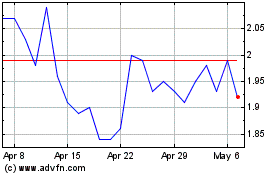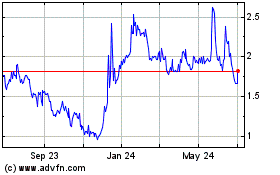Cognition Therapeutics, Inc., (Nasdaq: CGTX), (the “Company” or
“Cognition”), today announced that the rationale and design of the
Company’s ongoing SHIMMER clinical trial of CT1812 will be
presented at the 2022 Clinical Trials in Alzheimer’s Disease (CTAD)
conference. The Phase 2 SHIMMER (COG1201) study is intended to
assess the safety, tolerability, and efficacy of CT1812 in
individuals with dementia with Lewy bodies (DLB). CT1812 is a novel
oral, once-daily small-molecule therapeutic designed to protect
neurons from pathogenic forms of proteins such as α-synuclein and
beta amyloid (Aβ) by preventing oligomers from binding to synapses.
There are currently no approved treatments for DLB, which
impacts an estimated 1.4 million people in the United States,
making it the second most common form of dementia. Patients may
present with symptoms including cognitive or motor deficits, or
changes in behavior (sleep disorders, hallucinations, anxiety),
which can masquerade as other conditions, making it challenging to
correctly diagnose DLB. It is believed that aggregated forms of
α-synuclein and Aβ bind to neurons, triggering failures in protein
trafficking and other key cellular functions. Such a catastrophic
failure in cellular function eventually leads to the loss of
neurons, driving disease pathology and giving rise to the
constellation of symptoms associated with DLB.
“We have published research1 demonstrating that σ-2 receptor
modulators such as CT1812 can be effective in reversing the
trafficking deficits caused by α-synuclein oligomers in in vitro
models,” stated Anthony Caggiano, M.D., Ph.D., chief medical
officer and head of R&D at Cognition. “This proof-of-principle
data, combined with the encouraging safety signals in our
Alzheimer's disease program, gave us the confidence to move forward
into our Phase 2 SHIMMER trial of CT1812 in DLB.”
The Company is conducting the study in collaboration with James
E. Galvin, MD, MPH, director of the Comprehensive Center for Brain
Health at the University of Miami Miller School of Medicine and the
Lewy Body Dementia Association (LBDA) with non-dilutive grant
funding of approximately $30 million from the National Institute on
Aging (NIA). The SHIMMER study is being conducted at over 30 sites
in the United States, many of which are LBDA centers of
excellence.
The Phase 2 SHIMMER trial will enroll approximately 120 adults
with mild-to-moderate DLB, who will be randomized to receive
placebo or once-daily oral doses of CT1812 for six months. In
addition to safety, this study will compare changes in cognitive
performance and physical activity using an innovative Clinical
Global Impression of Change tool that has been modified to provide
DLB-specific prompts on cognition, motor, behavioral, sleep and
autonomic features. More details on the study and its inclusion and
exclusion criteria may be found on www.clinicatrials.gov.
Poster details
|
Date/Time: |
4:00pm PT on November 29th through 6:00pm PT on November 30th |
|
Title: |
A Phase 2 Study of the Sigma-2 Ligand CT1812 in Participants with
Dementia with Lewy Bodies (P027) |
|
Authors: |
James Galvin, Magdalena Tolea, Michael Grundman, Mary Hamby,
Anthony Caggiano |
About Dementia with Lewy BodiesAn estimated 1.4
million Americans are living with DLB, a progressive disease that
accounts for approximately 5-10% of all dementia cases. DLB has
overlapping pathology and symptomology of Parkinson’s and
Alzheimer’s diseases, making it challenging to diagnose. DLB is
caused by a build-up of a protein, α-synuclein, which forms
deposits, called Lewy bodies, in the brain. Oligomers of
α-synuclein are highly toxic and bind to neurons where they impair
critical cellular processes, causing synaptic dysfunction and loss.
Patients with DLB often experience cognitive, physical, sleep and
behavioral symptoms, including hallucinations, delusions and mood
changes. There are currently no disease-modifying treatments
approved for DLB patients.
About Cognition TherapeuticsCognition
Therapeutics, Inc. is a clinical-stage biopharmaceutical company
engaged in the discovery and development of innovative, small
molecule therapeutics targeting age-related degenerative disorders
of the central nervous system and retina. We are currently
investigating our lead candidate CT1812 in clinical programs in
Alzheimer’s disease, dementia with Lewy bodies (DLB) and dry
age-related macular degeneration (dry AMD). We believe CT1812 and
our pipeline of σ-2 receptor modulators can regulate pathways that
are impaired in these diseases. We believe that targeting the σ-2
receptor with CT1812 represents a mechanism functionally distinct
from other current approaches in clinical development for the
treatment of degenerative diseases. More about Cognition
Therapeutics and its pipeline can be found
at https://cogrx.com/
1 Limegrover CS et al. Sigma‐2 receptor antagonists rescue
neuronal dysfunction induced by Parkinson’s patient brain‐derived
α‐synuclein. J Neurosci Res. 2021; 00: 1– 16.
Forward-Looking StatementsThis press release
contains forward-looking statements within the meaning of The
Private Securities Litigation Reform Act of 1995. All statements
contained in this press release, other than statements of
historical facts or statements that relate to present facts or
current conditions, including but not limited to, statements
regarding our cash and financial resources and our clinical
development plans, are forward-looking statements. These statements
involve known and unknown risks, uncertainties and other important
factors that may cause our actual results, performance, or
achievements to be materially different from any future results,
performance, or achievements expressed or implied by the
forward-looking statements. In some cases, you can identify
forward-looking statements by terms such as “may,” “might,” “will,”
“should,” “expect,” “plan,” “aim,” “seek,” “anticipate,” “could,”
“intend,” “target,” “project,” “contemplate,” “believe,”
“estimate,” “predict,” “forecast,” “potential” or “continue” or the
negative of these terms or other similar expressions. We have based
these forward-looking statements largely on our current
expectations and projections about future events and financial
trends that we believe may affect our business, financial
condition, and results of operations. These forward-looking
statements speak only as of the date of this press release and are
subject to a number of risks, uncertainties and assumptions, some
of which cannot be predicted or quantified and some of which are
beyond our control. Factors that may cause actual results to differ
materially from current expectations include, but are not limited
to: competition, our ability to secure new (and retain existing)
non-dilutive grant funding, our ability to grow and manage growth,
maintain relationships with suppliers and retain our management and
key employees; our ability to successfully advance our current and
future product candidates through development activities,
preclinical studies and clinical trials and costs related thereto;
the timing, scope and likelihood of regulatory filings and
approvals, including regulatory approval of our product candidates;
changes in applicable laws or regulations; the possibility that we
may be adversely affected by other economic, business or
competitive factors; our estimates of expenses and profitability;
the evolution of the markets in which we compete; our ability to
implement our strategic initiatives and continue to innovate our
existing products; our ability to defend our intellectual property;
the impact of the COVID-19 pandemic on our business, supply chain
and labor force; and the risks and uncertainties described in the
“Risk Factors” sections of our filings with the Securities Exchange
Commission. You should not rely on these forward-looking statements
as predictions of future events. The events and circumstances
reflected in our forward-looking statements may not be achieved or
occur, and actual results could differ materially from those
projected in the forward-looking statements. Moreover, we operate
in a dynamic industry and economy. New risk factors and
uncertainties may emerge from time to time, and it is not possible
for management to predict all risk factors and uncertainties that
we may face. Except as required by applicable law, we do not plan
to publicly update or revise any forward-looking statements
contained herein, whether as a result of any new information,
future events, changed circumstances or otherwise.
Contact Information:Cognition Therapeutics,
Inc. info@cogrx.com
Aline Sherwood (media) Scienta
Communications asherwood@scientapr.com
Daniel Kontoh-Boateng / Rosalyn Christian
(investors) Tiberend Strategic Advisors,
Inc. dboateng@tiberend.com /
rchristian@tiberend.com
Cognition Therapeutics (NASDAQ:CGTX)
Historical Stock Chart
From Aug 2024 to Sep 2024

Cognition Therapeutics (NASDAQ:CGTX)
Historical Stock Chart
From Sep 2023 to Sep 2024
